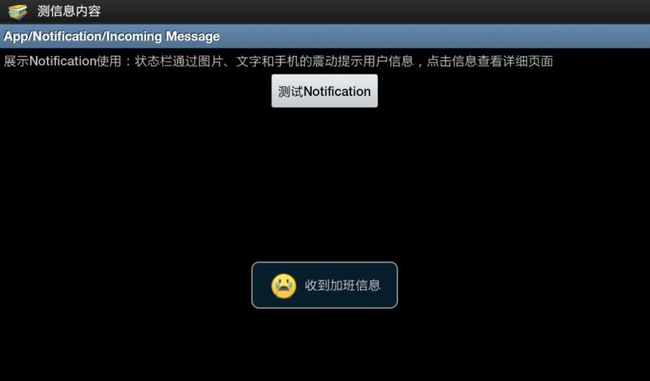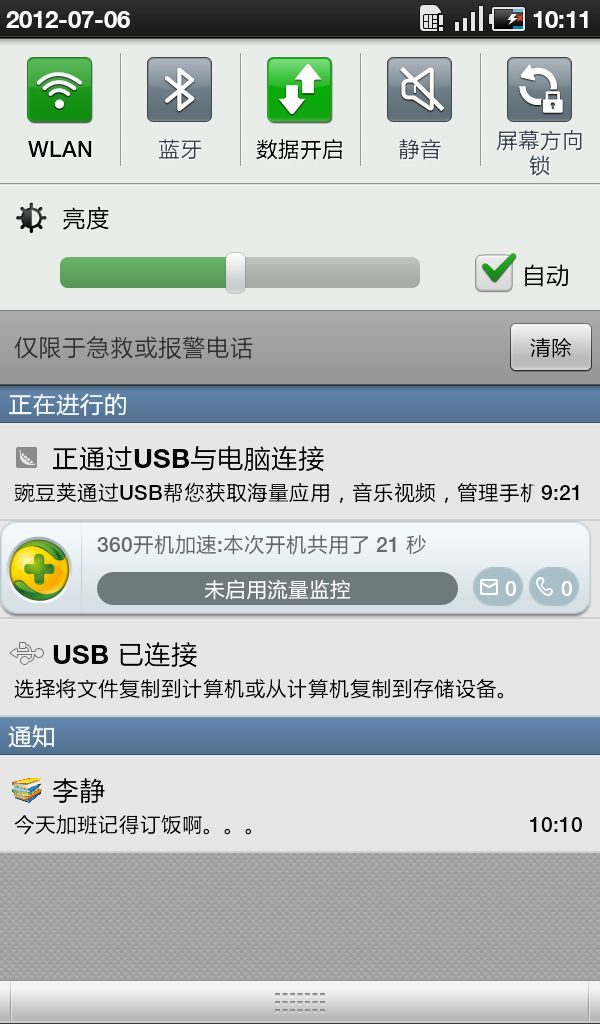android2.3 api demo 学习系列(21)--App/Notification/Incoming Message
现在我们开始学习android的Status Bar Notifications相关内容
1、首先我们来实现一个Notification:在status bar添加一个图片和信息,并让手机震动。用户打开status bar看到更详细的信息,点击该Notification打开一个activity
首先我们来看实现代码:
protected void showNotification() {
// look up the notification manager service
NotificationManager nm = (NotificationManager)getSystemService(NOTIFICATION_SERVICE);
// The details of our fake message
CharSequence from = "angie";
CharSequence message = "今天加班记得订饭啊。。。";
// The PendingIntent to launch our activity if the user selects this notification
PendingIntent contentIntent = PendingIntent.getActivity(this, 0,
new Intent(this, IncomingMessageView.class), 0);
// The ticker text, this uses a formatted string so our message could be localized
String tickerText = getString(R.string.app_notification_incomingmessage_view_msg1, message);
// construct the Notification object.
Notification notif = new Notification(R.drawable.main, tickerText,
System.currentTimeMillis());
// Set the info for the views that show in the notification panel.
notif.setLatestEventInfo(this, from, message, contentIntent);
// after a 100ms delay, vibrate for 250ms, pause for 100 ms and
// then vibrate for 500ms.
notif.vibrate = new long[] { 100, 250, 100, 500};
// Note that we use R.layout.incoming_message_panel as the ID for
// the notification. It could be any integer you want, but we use
// the convention of using a resource id for a string related to
// the notification. It will always be a unique number within your
// application.
nm.notify(R.string.app_notification_incomingmessage_view_msg1, notif);
}
apidemo里面有详细的注释说明,能很轻松的理解代码的意图。
我们来看下效果图:
相关知识:
1、sdk中关于notification的说明
我们可以使用activity和service来创建一个notification,由于activity可以和用户交互,一般我们更多的是service来使用notification提醒用户。
我们通过Notification的实例来配置notification的图片,信息,intent以及一些其他的附加信息。android的系统是使用NotificationManager来执行和管理Notification,我们不能直接的实例化NotificationManager,必须通过getSystemService()来获取它的引用。将我们得Notification通过notify()传递进去。下面我们来看下创建一个notification的步骤
1)获得 NotificationManager引用:
String ns = Context.NOTIFICATION_SERVICE; NotificationManager mNotificationManager = (NotificationManager) getSystemService(ns);2)实例化
Notification:
int icon = R.drawable.notification_icon; CharSequence tickerText = "Hello"; long when = System.currentTimeMillis(); Notification notification = new Notification(icon, tickerText, when);
3)
定义notification的 message 和
PendingIntent:
Context context = getApplicationContext(); CharSequence contentTitle = "My notification"; CharSequence contentText = "Hello World!"; Intent notificationIntent = new Intent(this, MyClass.class); PendingIntent contentIntent = PendingIntent.getActivity(this, 0, notificationIntent, 0); notification.setLatestEventInfo(context, contentTitle, contentText, contentIntent);
4)将notification递交给NotificationManager
private static final int HELLO_ID = 1; mNotificationManager.notify(HELLO_ID, notification);
2、管理notification
我们通过
NotificationManager.notify(int, Notification)交付我们得notification给NotificationManager。全第一个参数为notification的唯一标示,第二个参数为notification对象。我们可以通过第一个参数来修改删除notification。
3、修改更新notification。通过再次调用setLateEventInfo方法可以修改除了上下文中得标题文字外的所有notification属性。修改后再次notify()就ok
4、自定义notification的layout
<RelativeLayout xmlns:android="http://schemas.android.com/apk/res/android"
android:id="@+id/layout"
android:layout_width="fill_parent"
android:layout_height="fill_parent"
android:padding="10dp" >
<ImageView android:id="@+id/image"
android:layout_width="wrap_content"
android:layout_height="fill_parent"
android:layout_alignParentLeft="true"
android:layout_marginRight="10dp" />
<TextView android:id="@+id/title"
android:layout_width="wrap_content"
android:layout_height="wrap_content"
android:layout_toRightOf="@id/image"
style="@style/NotificationTitle" />
<TextView android:id="@+id/text"
android:layout_width="wrap_content"
android:layout_height="wrap_content"
android:layout_toRightOf="@id/image"
android:layout_below="@id/title"
style="@style/NotificationText" />
</RelativeLayout>
我们注意到textview的style属性,在版本2.3之前我们可以这么定义
<?xml version="1.0" encoding="utf-8"?>
<resources>
<style name="NotificationText">
<item name="android:textColor">?android:attr/textColorPrimary</item>
</style>
<style name="NotificationTitle">
<item name="android:textColor">?android:attr/textColorPrimary</item>
<item name="android:textStyle">bold</item>
</style>
<!-- If you want a slightly different color for some text,
consider using ?android:attr/textColorSecondary -->
</resources>
2.3之后:
<?xml version="1.0" encoding="utf-8"?>
<resources>
<style name="NotificationText" parent="android:TextAppearance.StatusBar.EventContent" />
<style name="NotificationTitle" parent="android:TextAppearance.StatusBar.EventContent.Title" />
</resources>
代码中加载自定义样式
RemoteViews contentView = new RemoteViews(getPackageName(), R.layout.custom_notification_layout); contentView.setImageViewResource(R.id.image, R.drawable.notification_image); contentView.setTextViewText(R.id.title, "Custom notification"); contentView.setTextViewText(R.id.text, "This is a custom layout"); notification.contentView = contentView;
自定义notification中无需再调用setLatestEventInfo
Intent notificationIntent = new Intent(this, MyClass.class); PendingIntent contentIntent = PendingIntent.getActivity(this, 0, notificationIntent, 0); notification.contentIntent = contentIntent; mNotificationManager.notify(CUSTOM_VIEW_ID, notification);

